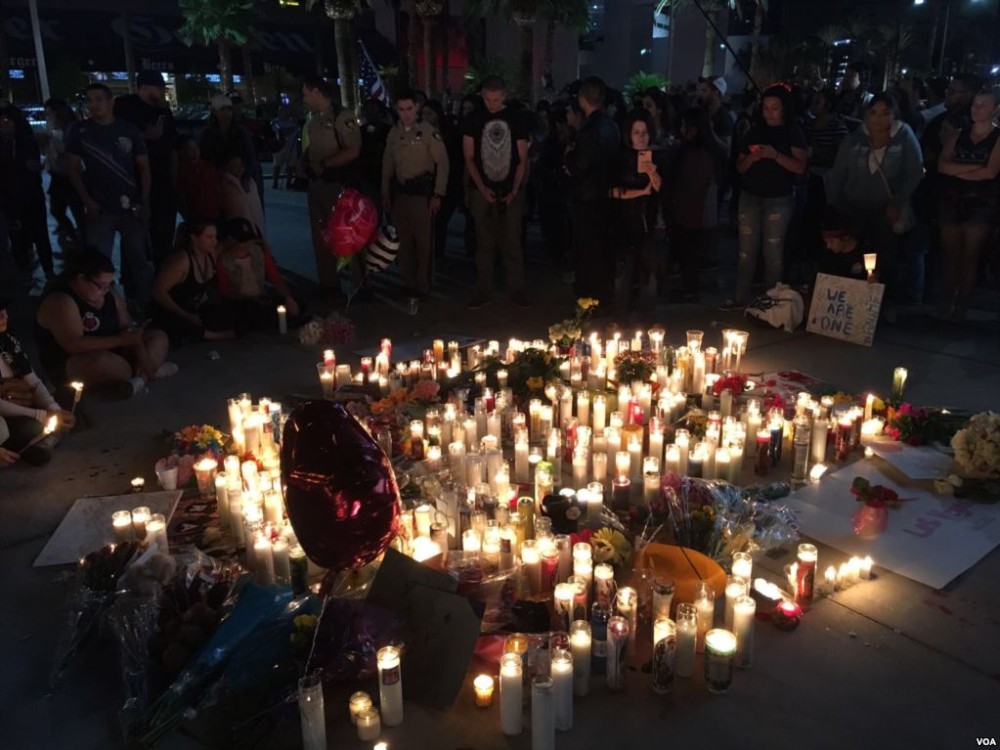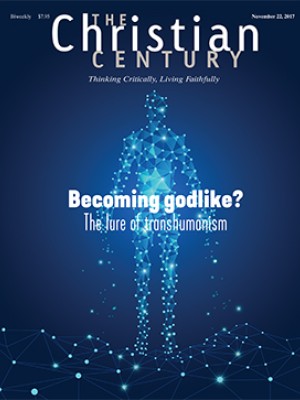Can we reclaim "thoughts and prayers"?
Instead of being an excuse for inaction, thoughts and prayers can turn us toward acts of love.

As the sending out of thoughts and prayers has become a more and more automatic response to the traumas of our day, a backlash has developed. And no wonder. After the massacre in Las Vegas, in which 58 people were killed and more than 500 wounded by one gunman in less than ten minutes, politicians lined up to say that now was not the time to rethink gun laws. It was, rather, a time for thoughts and prayers. This response to gun violence has become so routinized that the phrase “thoughts and prayers” has its own Wikipedia entry, which explains that thoughts and prayers are frequently offered in lieu of taking meaningful action.
In the wake of each new tragedy, my students watch their news feeds and timelines fill up with people’s ridicule of thoughts and prayers. They struggle with how to respond. They too find it revolting that the appeal to prayer has been co-opted by political interests. But they also believe thinking and praying to be meaningful actions. They worry about how we are ever going to reclaim the language of prayer.
Read our latest issue or browse back issues.
In a course on contemplative prayer this semester, we’ve been reading some of the great teachers: Origen of Alexandria, Howard Thurman, Simone Weil, and others. Their voices have echoed through the hurricanes, gun massacres, fires, and floods that have shaken the world—as well as through our own local traumas. We’ve searched in their books for a fresh way to talk about intercessory prayer. There is nothing like today’s mechanical appeal to thoughts and prayers in such writers’ work. But there is plenty of teaching about praying for others and about the relation of prayer to the life of the world.
We were surprised to find that Origen, in the third century, was also crafting a response to those who think prayer is worthless and “wish to do away with the word altogether.” Why pray, many of his contemporaries asked, if God already knows everything, including what we need and what will happen in the future? Why pray if prayer is not going to change anything?
Origen’s answer was that prayer is not useless but rather a mark of our freedom as rational beings alive in the world. For Origen, prayer does not immobilize us; it activates us. God uses our freedom, Origen insists, for the benefit of others. When we pray, we participate in God’s work.
Closer to our own time, Thurman—the theologian and philosopher of the civil rights movement—teaches that prayer is the hunger for God within us calling to the God who created us. Prayer is what we were made for, and if we seek God in prayer, Thurman says, we won’t be able to stop ourselves from praying for others. The question of whether it does any good or not is almost beside the point. We pray for others because it is “the most natural thing in the world,” not because we know what the outcome will be.
Yet Thurman, like Origen, believed that prayer does have effects in the world. Prayer opens our life to another’s need and helps us see what that need has to do with us. More mysteriously, Thurman says, our prayer for another might quicken the spirit of the person for whom we pray, awaken their own hunger, and so put them in the path of what he calls “the vast creative energies of God.” These two effects of prayer seem like two dimensions of the same experience, with God’s vast creative energies winding through the lives of the one who prays and the one who is prayed for, filling the space between us with a growing understanding of what we owe one another and a growing desire to be of use to one another.
What Thurman calls an opening of ourselves to God and to one another, Weil describes as a focusing of our attention, a turning of our gaze. Turning our attention to God and to our suffering neighbor—each requires a willingness to be present to them, without turning either God or neighbor into a commodity or “an occasion for doing good.” It is to be fully present even to what is invisible to us, to remain turned toward love even in the midst of our neighbor’s affliction and our own.
Recently I heard the writer and activist Terry Tempest Williams give a talk on the relationship between contemplative prayer and public vocation. She spoke about trying to stay turned toward the realities of climate change without becoming numb. “I choose not to look away,” she said. “For me, that is contemplative prayer. It is praying without ceasing.”
Perhaps this is one way we might recover the language and the practice of intercessory prayer: by recovering the language and the posture of turning. If sending out thoughts and prayers has become shorthand for inaction, let’s instead gather up our thoughts and our prayers and turn with them toward others. Let’s stay turned until their concern becomes our own and our encounter with God’s vast creative energy sets us free to change.
A version of this article appears in the November 22 print edition under the title “Thoughts and prayers.”






